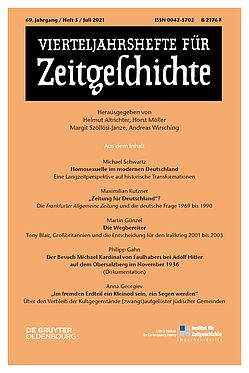- The Institute
- Research
- Dictatorships in the 20th Century
- Democracies and their Historical Self-Perceptions
- Transformations in Most Recent History
- International and Transnational Relations
- Edited Source Collections
- Dissertation Projects
- Completed Projects
- Dokumentation Obersalzberg
- Center for Holocaust Studies
- Berlin Center for Cold War Studies
- Publications
- Vierteljahrshefte
- The Archives
- Library
- Center for Holocaust Studies
- News
- Dates
- Press
- Recent Publications
- News from the Institute
- Topics
- Munich 1972
- Confronting Decline
- Feminist, Pacifist, Provocateur
- Der Mauerbau als Audiowalk
- Digital Contemporary History
- Transportation in Germany
- Envisaged Futures at the End of the Cold War
- From the Reichsbank to the Bundesbank
- German Federal Chancellery
- History of Sustainabilities: Discourses and Practices since the 1970s
- Changing Work
- Democratic Culture and the Nazi Past
- The History of the Treuhandanstalt
- Foreign Policy Documentation (AAPD)
- Dokumentation Obersalzberg
- Hitler, Mein Kampf. A Critical Edition
- "Man hört, man spricht"
Issue 3/2021
Content Overview: English Titles and Abstracts:
- Michael Schwartz: Homosexuals in Modern Germany. A Long-Term Perspective on Historical Transformations. - A deeper look into the issue
- Maximilian Kutzner: A “Newspaper for Germany”? The Frankfurter Allgemeine Zeitung and the German Question, 1969 to 1990.
- Martin Günzel: The Trailblazers. Tony Blair, Great Britain and the Decision to Go to War in Iraq, 2001 to 2003.
- Philipp Gahn: Contradictions of a Modus Vivendi. Documents on the Visit of Michael Cardinal von Faulhaber with Adolf Hitler on the Obersalzberg in November 1936.- Newspaper Articles, Additional Material
- Anna Georgiev: “To Be a Treasure in a Foreign Continent, To Become a Blessing”. About the Whereabouts of Cult Objects of (Forcibly) Dissolved Jewish Communities.
Abstracts
Michael Schwartz, Homosexuals in Modern Germany. A Long-Term Perspective on Historical Transformations
The history of homosexual people in modern Germany not encompasse persecution and discrimination, even if it is often remembered as such. Of course homosexual men did suffer massive persecution, and lesbian women were also exposed to many forms of discrimination. Yet the history of the last 200 years not only manifest those transformations in handling homosexuality, which since the 1990s have led to equality, but also a number of changes of a highly different nature. We neither encounter a continuum of repression nor a linear narrative of emancipation, but rather a highly contradictory long-term development.
Maximilian Kutzner, A “Newspaper for Germany”? The Frankfurter Allgemeine Zeitung and the German Question, 1969 to 1990
To this day, the Frankfurter Allgemeine Zeitung (FAZ) calls itself a “newspaper for Germany”. This was the aspiration of its founders. The stabilisation of two German states, however, challenged the position of the FAZ in matters of German nationhood policy. How did it position itself regarding Neue Ostpolitik, the increased engagement with the East? Did the newspaper successfully establish itself as a trendsetter in this field of policy? The article reveals conflicts among the editorial staff as well as outside attributions by both West and East German actors. The author demonstrates the tensions between the FAZ’s own line and the recognition of the political facts regarding German nationhood during the 1970s and 1980s. Was it ready to relinquish old principles for the achievement of German unity?
Martin Günzel, The Trailblazers. Tony Blair, Great Britain and the Decision to Go to War in Iraq, 2001 to 2003
Great Britain’s participation in the Iraq War starting in 2003 is one of the most controversial events in recent British history and has strongly shaped the assessment of Tony Blair’s premiership. Questions, what were the reasons and aims which motivated the British Government at the time to decide upon a course of full support of this war initiated by the United States, have not been fully explained to date. Sources now available indicate that very early on London decided to join the war and that the Government misled the public about its motives. The way in which the war was ultimately pushed through diplomatically and justified publicly has shaped the perspective on the war more decisively than it was long assumed.
Philipp Gahn, Contradictions of a Modus Vivendi. Documents on the Visit of Michael Cardinal von Faulhaber with Adolf Hitler on the Obersalzberg in November 1936
The months between November 1936 and January 1937 were a period of the greatest tension for Michael von Faulhaber. In a reception akin to that of a Primate of the German episcopate, he met Hitler on the Obersalzberg in order to undertake a “final attempt” to reach an understanding between church and state. In January he was in Rome for consultations, from which his draft text for the encyclical “Mit brennender Sorge” (“With Burning Concern”) emerged. In between, there were hectic weeks, during which he pursued a double strategy: On the one hand, without any reservations and up to the point of self-renunciation, he remained ready for negotiations, while on the other hand he did not shy away from public protest. The documents presented here corroborate the illusion, which shaped these actions, even making his contribution to the encyclical appear to us in a different light.
Anna Georgiev, “To Be a Treasure in a Foreign Continent, To Become a Blessing”. About the Whereabouts of Cult Objects of (Forcibly) Dissolved Jewish Communities
Confronted by signs of disintegration among smaller rural Jewish communities, Jewish organisations in Germany even during the Weimar Republic discussed questions of cataloguing and distributing Judaica which were no longer needed. During the course of the systematic persecution and murder of the Jewish population, these topics were not dropped, but rather dealt with more systematically. The Reichssicherheitshauptamt (Reich Security Main Office) at first tolerated these structures developed by Jewish organisations, certainly also because exploitation possibilities were lacking. The true intention of this collection – providing the objects to communities abroad – proved to be impossible, however.









